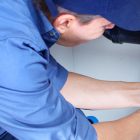When your refrigerator stops working efficiently, the compressor is often the first thing to check. Refrigerator compressor issues can cause a variety of problems, from excessive noise to complete cooling failure. In this comprehensive guide, we’ll explore the common issues with refrigerator compressors, how to diagnose them, and what steps to take for repair or replacement. If you’re facing persistent refrigerator compressor issues, don’t hesitate to reach out for professional assistance at +971545356777.
Contents
What is a Refrigerator Compressor and How Does It Work?
The refrigerator compressor is the heart of your cooling system. It compresses the refrigerant and circulates it through the coils, where it absorbs heat and cools the interior of your refrigerator. Understanding how the compressor works can help you recognize when something is wrong and why it might be causing issues.
Key Functions of a Refrigerator Compressor:
- Compression: The compressor squeezes the refrigerant gas, raising its pressure and temperature.
- Circulation: It pushes the compressed refrigerant through the condenser coils to dissipate heat.
- Cooling: After the refrigerant cools down, it passes through the evaporator coils, where it absorbs heat from the fridge interior.
If your refrigerator isn’t cooling properly, it’s possible that the compressor isn’t performing these essential functions correctly. Signs of refrigerator compressor issues can include unusual noises, longer running cycles, or a complete lack of cooling. When these problems arise, it’s essential to diagnose the cause quickly to prevent further damage.
Common Refrigerator Compressor Issues and Their Symptoms
Refrigerator compressor issues can manifest in various ways. Knowing the symptoms can help you identify the problem early and decide whether a repair or replacement is necessary.
1. Refrigerator Not Cooling: One of the most obvious signs of a compressor issue is when your refrigerator stops cooling. This can happen due to a lack of refrigerant, a faulty thermostat, or a compressor that isn’t functioning properly. If the compressor is running but the fridge isn’t cooling, it may be time to call a professional at +971545356777.
2. Loud Noises: Compressors can produce loud, unusual noises when they start to fail. If you hear knocking, humming, or clicking sounds from the back of the refrigerator, it could indicate that the compressor is struggling to operate. These noises are often the result of worn-out parts inside the compressor.
3. Constantly Running Compressor: A compressor that runs continuously without cycling off could indicate a problem. This can lead to increased energy consumption and higher electricity bills. The issue might be related to a faulty thermostat or a refrigerant leak, but in many cases, it’s the compressor itself that’s causing the problem.
4. Refrigerator Turning On and Off Frequently: If your refrigerator compressor turns on and off frequently, this is known as short cycling. Short cycling can be caused by a malfunctioning thermostat, an overload relay, or a failing compressor. This issue not only affects the cooling efficiency but also puts additional stress on the compressor, leading to premature failure.
5. Overheating Compressor: Compressors can overheat due to electrical issues, poor ventilation, or internal mechanical problems. An overheating compressor may cause the refrigerator to stop cooling entirely. If you notice that the compressor is too hot to touch, it’s crucial to address the issue immediately to avoid complete failure.
Diagnosing Refrigerator Compressor Issues
Proper diagnosis of refrigerator compressor issues requires some technical knowledge and tools. However, there are a few basic steps you can take to determine whether the compressor is at fault.
1. Check the Power Supply: Before diving into complex diagnostics, make sure the refrigerator is receiving power. Check the power cord, outlet, and circuit breaker to ensure everything is functioning correctly.
2. Listen to the Compressor: As mentioned earlier, unusual noises can be a sign of compressor problems. Listen carefully to the sounds your refrigerator makes. If the compressor is making loud or strange noises, it could be failing.
3. Feel the Compressor: Carefully touch the compressor to see if it’s overheating. A compressor that’s too hot to touch may indicate an internal problem. However, always be cautious when doing this, as touching a hot compressor can cause burns.
4. Test the Start Relay: The start relay is a component that helps the compressor start. If it fails, the compressor may not run at all. You can test the start relay using a multimeter to check for continuity. If the relay is faulty, replacing it might resolve the issue.
5. Measure the Refrigerant Levels: Low refrigerant levels can cause the compressor to overwork and eventually fail. A professional technician can measure the refrigerant levels and recharge the system if necessary.
If you’re unsure about performing these diagnostic steps yourself, it’s always best to consult a professional. You can contact an expert technician at +971545356777 for a thorough inspection and diagnosis of your refrigerator compressor issues.
How to Fix Refrigerator Compressor Issues
Once you’ve identified the problem with your refrigerator compressor, the next step is to decide whether to repair or replace it. The right choice depends on the severity of the issue, the age of your refrigerator, and your budget.
1. Repairing the Compressor: In some cases, repairing the compressor can be a cost-effective solution. If the problem is due to a faulty start relay, capacitor, or low refrigerant, these issues can often be repaired without replacing the entire compressor. However, if the compressor is severely damaged or worn out, repairs may only provide a temporary fix.
2. Replacing the Compressor: Replacing a refrigerator compressor is a more involved and expensive process. If your refrigerator is relatively new and in good condition, replacing the compressor may be worthwhile. However, if the refrigerator is old, it might be more cost-effective to replace the entire unit.
3. Preventing Future Issues: Regular maintenance can help prevent refrigerator compressor issues. Keep the condenser coils clean, ensure proper ventilation around the refrigerator, and have a professional check the refrigerant levels periodically. Taking these steps can extend the life of your compressor and keep your refrigerator running efficiently.
When to Call a Professional for Refrigerator Compressor Issues
Refrigerator compressor issues can be complex and challenging to fix on your own. While some minor problems can be resolved with simple repairs, more serious issues require the expertise of a professional technician. Here are some situations where it’s best to call a professional:
1. The Refrigerator Isn’t Cooling:
If your refrigerator stops cooling altogether, it’s likely due to a serious compressor issue. A professional can diagnose the problem and recommend the best course of action, whether it’s a repair or replacement.
2. The Compressor is Making Unusual Noises:
Unusual noises from the compressor are often a sign of internal mechanical failure. If you hear knocking, humming, or buzzing sounds, it’s time to call a professional. Continuing to run the refrigerator with a noisy compressor can lead to complete failure.
3. The Compressor is Overheating:
Overheating compressors can be dangerous and may lead to electrical fires. If you notice that the compressor is too hot to touch, turn off the refrigerator and call a technician immediately.
4. The Refrigerator is Short Cycling:
Short cycling can put a lot of stress on the compressor and shorten its lifespan. A professional technician can identify the cause of short cycling and fix the issue before it leads to more severe problems.
5. You’re Unsure of the Problem:
If you’re unsure about what’s causing the refrigerator compressor issues, it’s best to consult a professional. Attempting to fix the problem without proper knowledge and tools can lead to further damage and costly repairs.
For expert assistance with refrigerator compressor issues, contact a professional technician at +971545356777.
Conclusion
Refrigerator compressor issues can be frustrating and inconvenient, but understanding the common problems and knowing how to diagnose them can help you make informed decisions about repairs or replacements. Whether it’s a noisy compressor, an overheating unit, or a refrigerator that simply won’t cool, addressing these issues promptly can prevent further damage and extend the life of your appliance.
Remember, while some minor repairs can be done at home, more serious compressor issues require the expertise of a professional. Don’t hesitate to reach out to a qualified technician at +971545356777 for help with diagnosing and fixing refrigerator compressor problems. With the right care and maintenance, your refrigerator can continue to serve you efficiently for years to come.



